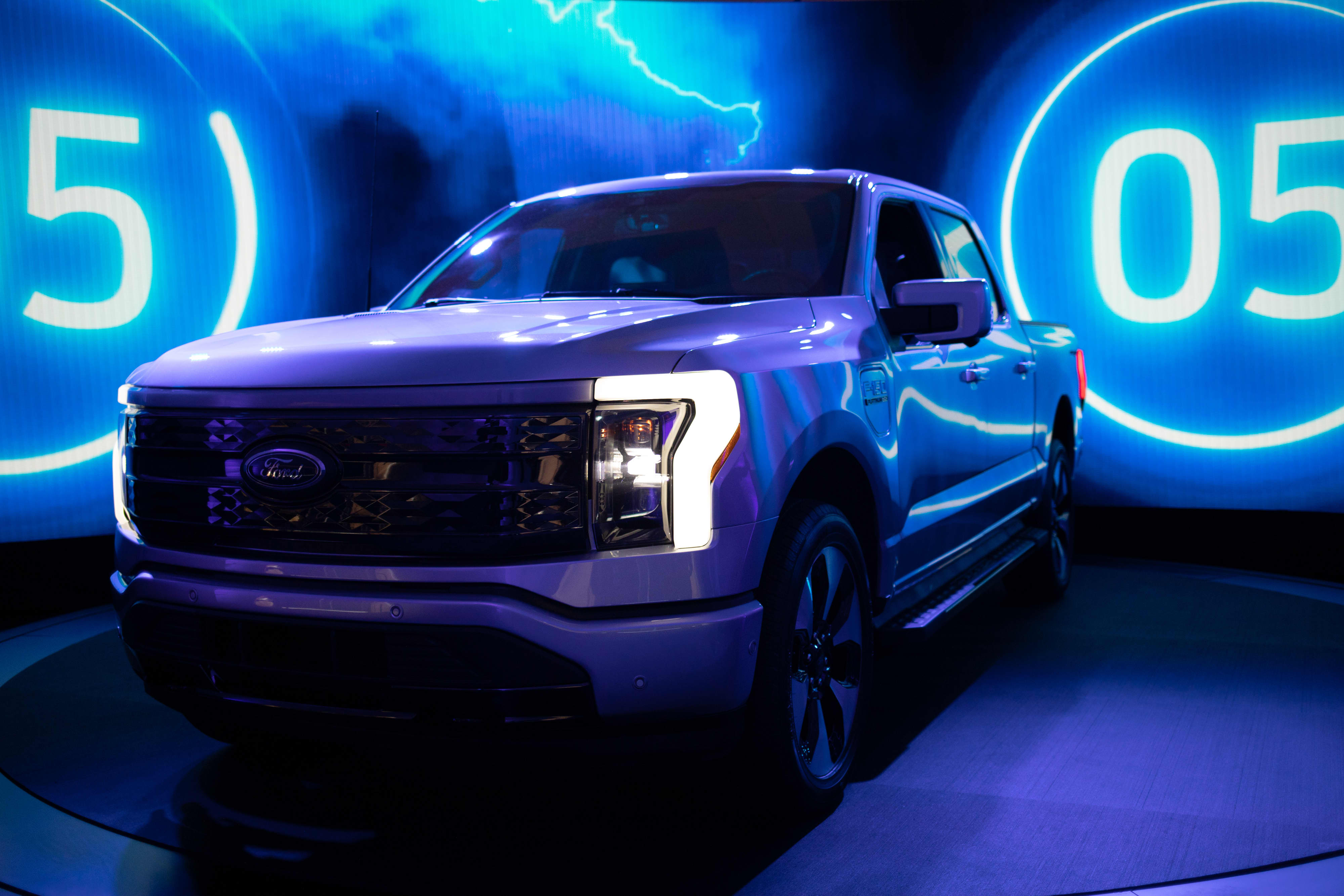DETROIT – Shares of Ford Motor soared by roughly 140% last year, beating Tesla, its larger crosstown rival General Motors and a host of new electric vehicle start-ups to become the best performing stock among automakers in 2021.
Investors have rewarded the company’s new direction under auto veteran Jim Farley, who took the helm in October 2020 after the board ousted industry outsider Jim Hackett.
Farley promised to be more open and direct with investors. He also launched the Ford+ restructuring plan, which shifts more resources to build electric vehicles like the upcoming F-150 Lightning pickup EV.
“We’re executing our plan and we’ll continue to do that so every business in our portfolio has a sustainable future. If not, we will restructure it,” he said in a January 2021 interview.
Morgan Stanley analyst Adam Jonas called 2021 “truly a breakthrough year for Ford… easily the most important year strategically for the company since the financial crisis.”
The company’s largest single-day share increase last year came on Dec. 10 when Farley confirmed on Twitter that Ford would triple production of its electric Mustang Mach-E to more than 200,000 units per year for North America and Europe by 2023. He told CNBC the day before that the company halted reservations of the F-150 Lightning after they hit 200,000 units.
Shares that day jumped 9.6% to close at a roughly 20-year high of $21.45 a share.
The next best day for investors came on Oct. 28 after the automaker delivered its third-quarter earnings where it raised its yearly guidance and delivered EPS that were double analysts’ estimates. Shares rose by 8.7%.
Shares also soared by 8.5% on May 26 during the automaker’s investor day which disclosed details of the Ford+ turnaround plan. They also jumped by 8.4% on Jan. 20 after Deutsche Bank added a short-term buy idea on the stock ahead of its 2020 earnings report.
Since Farley took the helm of Ford more than 15 months ago, the stock is up by more than 200%. Whether he can continue that run is largely expected to be determined by the company’s ability to deliver on initiatives outlined in his Ford+ plan that included accelerating EV plans and achieving an 8% adjusted profit margin before interest and taxes by 2023.
Ford is rated overweight with a price target of $20.25 a share and a long-term growth rate of 67.8%, according to an average of 22 analysts compiled by FactSet. Shares closed last year at $20.77, up by 136.3% in 2021.
Ford, at a market cap of $83 billion, still has a long road ahead of it to get its market value up to most of its established competitors as well as EV start-up Rivian.
Here’s how other legacy automakers as well as top emerging EV start-ups ended last year and what analysts expect from them in 2022, according to average analysts compiled by FactSet.
Tesla (TSLA): $1,056.78, up 49.8%
- Rating/target: Hold/$878
- Market cap: $1.1 trillion
Lucid (LCID, since July 26): $38.05, up 41.8%
- Rating/target: Overweight/$44.33
- Market cap: $62.6 billion
Volkswagen (VWAGY): $29.39, up 41.2%
- Rating/target: Overweight/$28.77
- Market cap: $127.9 billion
General Motors (GM): $58.63, up 40.8%
- Rating/target: Buy/$74.45
- Market cap: $85.1 billion
Toyota (TM): $185.30, up 19.9%
- Rating/target: Overweight/$211.59
- Market cap: $253.2 billion
Ferrari (RACE): $258.82, up 12.8%
- Rating/target Hold/$258.40
- Market cap: $47.6 billion
Stellantis (STLA): $18.76, up 10%
- Rating/target: Buy/$26.51
- Market cap: $59.2 billion
Fisker (FSR): $15.73, up 7.4%
- Rating/target: Overweight/$25.50
- Market cap: $4.7 billion
Rivian (RIVN, since Nov. 10): $103.69, up 2.9%
- Rating/target: Overweight/$133.92
- Market cap: $93.4 billion
Nio (NIO): $31.68, down 35%
- Rating/target: Buy/$59.18
- Market cap: $52.1 billion
Nikola (NKLA): $9.87, down 35.3%
- Rating/target: Hold/$15.29
- $4 billion
Lordstown Motors (RIDE): $3.45, down 82.8%
- Rating/target: Underweight/$4.60
- $663.2 million
– CNBC’s Michael Bloom contributed to this report.

where to buy stromectol – how much does ivermectin cost buy generic tegretol
cheap amoxicillin pill – buy combivent generic combivent 100 mcg cheap
azithromycin 500mg cost – generic tinidazole 300mg buy bystolic 20mg online cheap
buy neurontin 100mg for sale – clomipramine 25mg sale itraconazole usa
where to buy lasix without a prescription – order piracetam for sale buy betnovate cream
augmentin 625mg ca – cymbalta 40mg canada purchase cymbalta sale
buy amoxiclav generic – cymbalta 20mg uk duloxetine price
buy semaglutide 14 mg without prescription – rybelsus 14 mg generic order periactin 4 mg pills
tadalafil 5mg us – tadalafil 20mg without prescription buy sildenafil 50mg
viagra generic – tadalafil 20mg pills buy tadalafil 40mg pills
buy cheap generic cenforce – buy chloroquine pills buy glucophage without prescription
order prilosec 10mg sale – tenormin drug where can i buy atenolol
clarinex brand – claritin tablet purchase dapoxetine pill
cytotec price – order generic xenical 60mg buy diltiazem pills
buy generic acyclovir over the counter – order crestor 20mg pill buy crestor medication
buy motilium 10mg – buy cheap generic tetracycline buy flexeril 15mg for sale